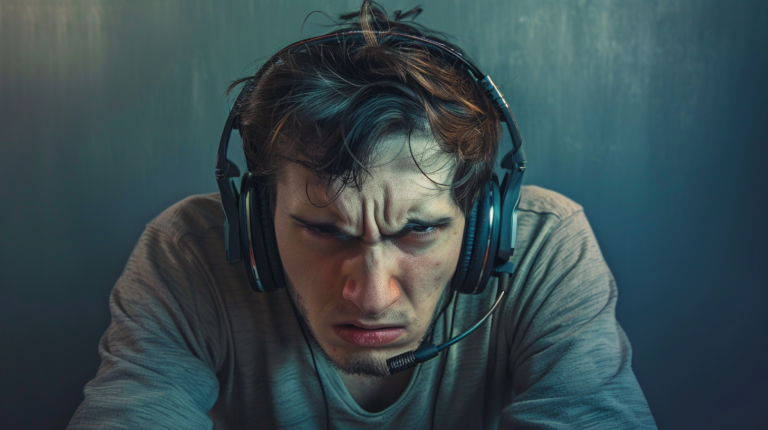Are you tired of everyday noise affecting your groove and thinking about investing in a pair of noise-canceling headphones? Hold your horses!
Is noise-canceling bad for your ears?
No, noise canceling isn’t bad for your ears. It can safeguard against hearing loss by letting you listen to audio at a lower volume in noisy outdoor environments. That said, prolonged use of noise-canceling headphones or earbuds can have adverse effects, including stress-induced headaches, mild to moderate dizziness, and, in extreme cases, vertigo.
Active Noise Canceling vs. Passive Noise Canceling – What’s the Difference?
Before discussing the pros and cons of noise-canceling headphones and their potential impact on hearing, let’s first discuss the two main mechanisms of noise cancellation:
Passive Noise Canceling (PNC)
Unlike active noise canceling, which uses ‘active’ circuitry, passive noise canceling relies on natural soundproofing techniques to block unwanted background noise. It uses absorptive materials such as high-density foam, pads, rubber or silicone gaskets, etc.
Going by this description, you can probably guess that passive noise-canceling headphones don’t require battery power and can work indefinitely as long as their soundproof seals are intact. For minimalistic and eco-friendly users, a passive noise-canceling headphone is ideal.
Active Noise Canceling (ANC)
Now, let’s talk about Active Noise Canceling, the more advanced mechanism of the two. Active noise-canceling headphones rely on active circuitry to ‘cancel’ ambient noises. These headphones come with tiny microphones located in each ear cup. These microphones are susceptible to even the slightest sound pressure and are tuned to detect even the smallest noise.
Once the microphones pick up a certain sound frequency, the internal ANC circuit generates the exact opposite sound frequency called ‘antiphase.’ This antiphase effectively ‘cancels’ the unwanted noise, allowing you to enjoy music in perfect peace and serenity!
Active and Passive Noise Cancellation at a Glance
| Aspect | Active Noise Canceling | Passive Noise Canceling |
| Mechanism | Uses an active circuit that generates antiphase to cancel external noise | Uses soundproof material to isolate ambient noise |
| Power Source | Active circuitry requires battery power | Zero power requirements |
| Effectiveness | Good noise-canceling characteristics | Moderate noise cancellation characteristics |
| Audio Quality | Antiphase can potentially disrupt audio quality | No impact on sound quality |
| Price | Usually expensive | Relatively affordable |
With that out of the way, let’s discuss the advantages and disadvantages of noise canceling.
The Advantages of Noise Canceling
The following are a few compelling reasons to buy noise-canceling headphones.
Hearing Protection
The biggest benefit of noise-canceling headphones is hearing protection; they let users enjoy music even in noisy outdoor environments while protecting their ears. Listening to noise above 80 dB can cause tinnitus, whereas even a short burst above 110 dB can potentially cause permanent hearing loss.
Improved Focus
Noise-canceling headsets reduce auditory distraction and boost focus, accelerating your learning process. This makes them particularly useful for students, especially those who have Attention Deficit Hyperactivity Disorder (ADHD), who often have a hard time concentrating on their studies.
Stress Reduction
Studies have shown that loud environmental noises can stimulate stress hormones, negatively affecting cerebro cardiovascular activity. This is an area where noise-canceling headphones and earbuds help. They protect your hearing and can also reduce stress and other health risks in the process.
Better Listening Experience
Another advantage of noise canceling headphones is the music listening experience, it doesn’t matter whether you’re at a noisy bus stop or a subway station, you can listen to your favorite tunes wherever you go. This makes them an ideal choice for the ‘melophiles’ among us!
Substitute for Earplugs
Noise-canceling headphones can also be used as a substitute for earplugs. So, whenever you’re out of earplugs, just use your noise-canceling headphones.
Improved Sleep
It’s difficult for some to nap on a plane or a train. With so many people crammed into a small space on a plane and the constant clackity-clack-clack of a train, good luck getting a good night’s sleep!
But with noise-canceling headphones, taking a nap is easier.
Better Audio Controls
Noise-canceling headphones typically give you more control over the audio quality than traditional headphones. Most noise-canceling headphones feature configurable sound equalizers, allowing you to fine-tune the audio to your liking.
Enhanced Privacy
Last but not least, noise-canceling headphones work both ways, i.e., you can’t hear others, nor can others hear you. So, if you like to crank up the volume while listening to your favorite tunes, a pair of noise-canceling headphones can help prevent the noise from ‘leaking out’ of the headphone’s earcups, ensuring perfect privacy.
But before you go out and buy your favorite noise-canceling headphones, it’s essential also to consider their quirks:
The Disadvantages of Noise Canceling
There are a few disadvantages you should be aware of to make an informed decision.
Comfort Concerns
Let’s start with comfort, which is at the top of most users’ lists. Noise-canceling headphones, especially passive noise-canceling headphones, can be a little uncomfortable. That’s because of the pressure on the ears to ‘cancel’ the ambient noise.
Wearing them for a few hours is generally acceptable. Still, continuous usage may cause fatigue and even give you a tension headache due to scalp muscles being contracted for an extended period.
Dizziness and Disorientation
While not the case with everyone, noise-canceling headphones can cause dizziness and disorientation in some people. That’s because our brain relies on auditory input from our ears to understand the surrounding environment better, and a long period of stony silence can temporarily impair and overwhelm it.
Higher Cost
Another minor disadvantage of noise-canceling headphones is their cost, usually more than ‘vanilla’ headphones because of the soundproofing materials (passive noise canceling), more complex circuitry (active noise canceling), or, in some cases, both.
Potential Safety Risks
While noise-canceling headphones are usually safe to wear indoors, things get complicated outdoors. With noise-canceling headphones on, you may be unable to hear important sounds such as car horns, sirens, alerts, alarms, etc. So, be on the lookout for any disturbances and, if possible, ask a friend to accompany you.
Muddy Audio
Certain active noise-canceling headphones, especially cheaper ones from relatively unknown brands, may introduce slight noise or a ‘hiss’ while playing a song, which some people may find a little distracting.
Potential Addiction
Noise-canceling headphones and the peace and serenity they provide can be somewhat addictive, mainly if you use the headphones for extended periods. This ‘addiction’ may make you less tolerant of loud noises, making you more irritable than usual.
In short, while noise-canceling headphones have advantages, you must also be aware of their potential drawbacks.
Are Earbuds or Headphones Better for Noise Canceling?
Headphones are better than earbuds for noise cancellation. They come with large cups filled with foam, cooling gel, and other noise-isolating materials, naturally letting less noise pass through. In comparison, earbuds only cover your ear canals and can’t muffle sound as effectively.
Does Noise Canceling Reduce Anxiety?
Yes, noise cancellation can reduce anxiety levels, especially for neurodivergents on the Autism Spectrum Disorder (ASD) spectrum and those who suffer from Hyperacusis or sensitivity to sound. Noise-canceling headphones can also be beneficial during long journeys, especially on trains and planes, and help you sleep better in noisy situations.
How Long Is Too Long to Wear Noise-Canceling Headphones?
Noise-canceling headphones are generally safe to wear for several hours. However, wearing headphones all day may cause migraines or vertigo for some. That’s because a prolonged absence of external noise may result in disorientation as our brains rely on hearing to maintain the body’s orientation. As a result, a complete lack of noise for extended periods can cause a general sense of confusion.
Conclusion
While noise-canceling headphones offer hearing protection, improved focus, and enhanced music experiences, caution is necessary as prolonged use may lead to discomfort, dizziness, and potential safety hazards, especially outdoors.
Now, if you’re wondering what gaming headset is best for you, remember to check out our comprehensive look at the best gaming headsets you can buy in 2023.

